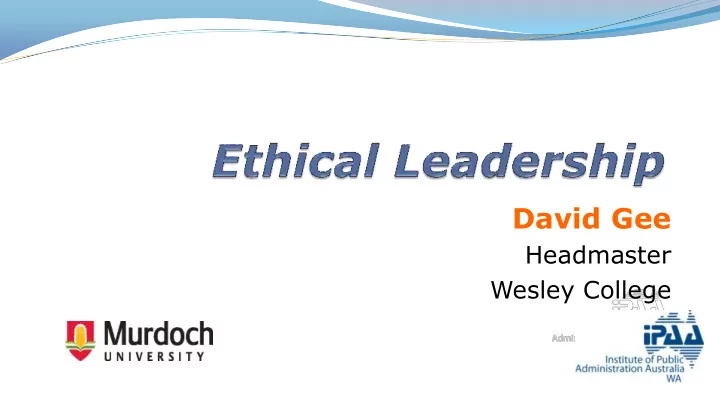

David Gee Headmaster Wesley College
ETHICAL LEADERSHIP What is ethics? What is leadership? Why ethical leadership?
SYSTEMS THINKING IN AN ETHICAL CONTEXT • Intuitive (emotional) • Deliberate Cognitive
FOUR STEPS OF DEVELOPMENT IN ETHICAL LEADERSHIP ETHICAL LEADERSHIP SOCIAL Ability to engage and APPLICATION influence others in their understanding, goals PROBLEM and solution of complex SOLVING Ability to use ethical dynamic ethics knowledge in the UNDERSTANDING problems over time ongoing management of Ability to use ethical through their actions dynamic ethics knowledge to solve and communication problems including static problems, such as Ability to talk about skills multiple stakeholders, those that might be ethics in one’s own lags and feedback presented in an ethics terms and explain that effects over time course or textbook Ability to use ethical knowledge to others knowledge to influence the design, implementation and ongoing management of structures, systems processes and culture .
ETHICAL REASONING FRAMEWORKS There are 4 broad ways / frameworks of ethical reasoning Utilitarian – do what will bring the greatest good for the greatest number Kantian – do what you could consistently ask anyone to do and never treat people as a means to an end Aristotelian – cultivate virtue as you pursue the good life Natural law theory – reasonably pursue what is humanly fulfilling in community with others
THE MULTIPLE LAYERS OF ETHICAL DECISION MAKING IN MODERN ORGANISATIONS Attributes of an ethical leadership Contribution Factors Compounding factors framework Society Cultural perception of ethical Local business standards’ and Behaviour governance • Understands values and what they mean in practice across a diverse range of settings and times Corporate Values and Vision Ability to challenge group views Increasing complexity of Organisational response to dissent • Develop personal alignment of values, actions and businesses communications Receptiveness to new ideas Domino effect of decision making Management of failure Management of conflicting • Develop external alignment of values, systems and Pressure to deliver performance priorities in business decision processes, culture and other enablers. making Individuals Build the capabilities for judgements, value trade offs • and for managing dynamic, complex and multi layered Moral Character & Values clarity Fear of failure problems in individuals, teams and organisation Thinking & judgment skills Lack of knowledge systems Focus on Achievements Competing demands of - Career aspirations resources and power Maintain responsibility and accountability for ethical • - Doing things right vs Personal career aspirations Doing things the right way action
THREATS TO ETHICAL BEHAVIOUR (INTENTIONAL AND UNINTENTIONAL) Lack of a framework for understanding • Blind spots • • Personal • Organisational • Societal • Organisational cultural contexts • Professional responsibility • Confidentiality Delegated authority • • Conflicts of interest Corruption • • Profit and short-termism thinking
THE ETHICAL HEALTH OF AN ORGANISATION Gauging the Ethical Health of an Organisation • Values driven • Governance • Policies and procedures • Behaviours
LIVING WELL AS AN ETHICAL LEADER • PLANNING AND REFLECTING • Get on ‘the balcony’ • Distinguish self from role • Externalise the conflict • Listen Seek out the alternative views • • Recognise own vulnerability to own unconscious biases • Dig deeply • Treat adversity as a friend • Be courageous Find a sanctuary • Preserve a sense of purpose •
Recommend
More recommend